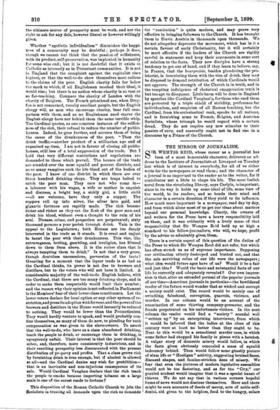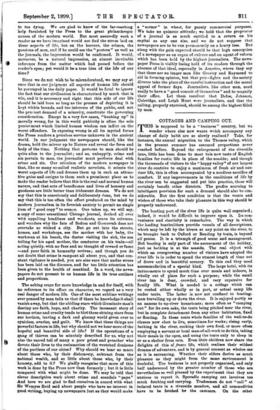THE MIRROR OF JOURNALISM,
STR WEMYSS REID, whose career as a journalist has been of a most honourable character, delivered an ad- dress to the Institute of Journalists at Liverpool on Tuesday last which is of interest to everybody, for all of us either write for the newspapers or read them; and the character of a journal is as important to the reader as to the writer, for it contributes not a little to shape his life. The most foolish novel from the circulating library, says Carlyle, is important, since in its way it holds up some ideal of life, some view of the world, to its readers, and so bends their mind and character in a certain direction if they yield to its influence. How much more important is a newspaper, read day by day, and from which alone most of us get our ideas about matters beyond our personal knowledge. Clearly, the owners of and writers for the Press have a heavy responsibility laid on them, and it was evidently with a lively sense of that responsibility that Sir Wemyss Reid held up so high a standard to his fellow-journalists, who will, we hope, profit by the advice so admirably given them.
There is a certain aspect of this question of the duties of the Press to which Sir Wetnyas Reid did not refer, but which has often struck us as of supreme importance, Supposing our civilisation utterly destroyed and blotted out, and that the sole surviving relics of our life were the newspapers ; what idea would future ages have of us? Would it be a fair and just idea? Would the basic and substantial facts of our life be correctly and adequately revealed? Our own impres- sion is that, after an extended perusal of the popular journals of our time—American journals in particular—the bewildered reader of the future would wonder that so wicked and corrupt
• a society could exist. The record would be mainly one of swindling, falsehood, corruption, quarrels, violence, and murder. In one column would be an account of the examination of some thieving company-promoter, and the frauds perpetrated on his unfortunate victims. In the next column the reader would find a "society '? scandal well "written up" by an enterprising interviewer, from which it would be inferred that the ladies at the close of this century were at least no better than they ought to be. Next to this would be a sensational murder case, in which some father had chopped his family in pieces with a hatchet. A vulgar story of domestic misery would follow, in which the facts given obviously concealed a mass of squalid indecency behind. Then would follow some ghastly picture of slum life or "Hooligan" activity, suggesting braised faces, diseased shapes, and famine-stricken dens of misery. We fear that even the pictures of modern legislative assemblies would not be too flattering, and as for the "City," our puzzled student would imagine that it was a special haunt of thieves. We do not say that in various corners hopeful items of news would not disclose themselves. Here and there might be seen accounts of deeds of mercy, acts of noble self- denial, aid given to the helpless, food to the hungry, solace
to the dying. We are glad to know of the far-reaching help furnished by the Press to the great philanthropic causes of the modern world. But moat assuredly such a reader as we have imagined would not find the stress laid on these aspects of life, but on the horrors, the crimes, the passions of men, and if he could see the "posters" as well as the journals, the impression would be confirmed. It would, moreover, be a natural impression, an almost inevitable inference from the matter which had passed before the reader's eyes; yet would it be a true idea of the life of our time?
Since we do not wish to be misunderstood, we may say at once that in our judgment all aspects of human life should be portrayed in the daily paper. It would be fatal to ignore the fact that our civilisation is characterised by much that is vile, and it is necessary and right that this side of our life should be laid bare so long as the process of depicting it is kept within bounds, and the interests of the public, and not the pm ient demand of a minority, constitute the governing consideration. Except in a very few cases, "hushing up" is morally wrong, for in this world publicity is often the sole punishment which limited human wisdom can inflict on the worst offenders. In exposing wrong in all its myriad forms the Press renders a priceless service unknown in the ancient world. In our judgment the newspapers should, like the drama, hold the mirror up to Nature and reveal the form and body of the time. Nothing that pertains to man should be quite alien to the journalist ; and as, unhappily, crime and sin pertain to man, the journalist must perforce deal with crime and sin. Our criticism of the modern newspaper is that, like so many so-called realistic novelists, it selects the worst aspects of life and dresses them up in such an attrac- tive guise and assigns to them such a prominent place as to make the reader believe that this is the real and normal human nature, and that acts of beneficence and lives of honesty and goodness are little better than iridescent dreams. We do not say that this is consciously and deliberately done, but we do say that this is too often the effect produced on the mind by modern journalism in its feverish anxiety to permit no single item of `. good copy" to escape. One takes up, we will say, a copy of some sensational Chicago journal, decked all over with appalling headlines and woodcuts, scans its columns. and wonders why the fate of Sodom and Gomorrah does not overtake so wicked a city. But go out into the streets, homes, and workshops, see the mother with her baby, the workman at his bench, the doctor visiting the sick, the son toiling for his aged mother, the conductor on his train—all acting quietly. with no fuss and no thought of reward or fame —and your faith in humanity revives; and though you do not doubt that crime is rampant all about you, and that con- stant vigilance is needed, you are also sure that undue stress has been laid on the diseases, and far too little attention has been given to the health of mankind. In a word, the news- papers do not present to us human life in its true outlines and proportions.
The aching craze for mere knowledge in and for itself, with no reference to its effect on character, we regard as a very real danger of modern life. One of the most sublime writings ever penned by man tells us that if there be knowledge it shall vanish away, but that the abiding stars which illuminate man's destiny are faith, hope, and charity. The incessant story of human crime and cruelty tends to blot these shining stars from our horizon, leaving a dark and gloomy world given over to cynicism. avarice, sad guilt. We know that these things are powerful factors in life, but why should not we hear more of the hopeful and beautiful side of life? If the operations of a gang of thieves can be minutely described for us, why not also the sacred toil of many a poor priest and preacher who devote their lives to the reclamation of the wretched denizens of the purlieus of our cities? Why should we hear so much about those who, by their dishonesty, subtract from the national wealth, and so little about those who, by their honesty, add to it ? We gladly recognise that more of this work is done by the Press now than formerly ; but it is little compared with what might be done. We may be told that clever descriptive work about crime and scandals "pays." And here we are glad to find ourselves in accord with what Sir Wemyss Reid said about people who have no interest in Rood writing, buying up newspapers iust as they would make a "corner" in wheat, for purely commercial purposes. We take no quixotic attitude; we hold that the proprietor of a journal is as much entitled to a return on his capital as any one else, and we do not suppose that newspapers are to be run permanently on a heavy loss. But along with the gain expected should be that high conception of a newspaper as an organ of culture and an agent of reform which has been held by the highest journalists. The news- paper Press is visibly losing hold of its readers through the absence of that ideal, especially in America, where they say that there are no longer men like Greeley and Raymond to aid in forming opinion, but that prie—flghts and the society divorce take the place of the careful instruction and the moral appeal of former days. Journalists, like other men, need really to have a "good conceit of themselves" and to magnify their office, Let them recollect that Defoe, Johnson, Coleridge, and Leigh Haut were journalists, and that the calling, properly exercised, should be among the highest filled by man.



































 Previous page
Previous page